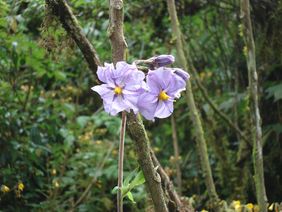Category : News
Published : December 4, 2013 - 3:04 PM
Potato is one of the most important food crops in the world, particularly in Bolivia, where the crop is a primary source of nutrition and food security for a population of 10.5 million. Although not commonly served on the dinner table nor grown on farm, the wild relatives of potato are equally important carrying an array of traits that continually adapt to changing climates.
Bolivia also has many potato wild relatives, of which 21 are endemic to the country. Out of these, at least 16 have shown to have important traits for plant breeding, such as resistance to late blight (Phytophthora infestans), one of the main diseases affecting potato cultivation in Bolivia; resistance to cyst nematodes (Globodera spp.) that attack the roots of the plant; as well as tolerance to various climatic factors such as extreme heat, drought or frost.
But crop wild relatives are increasingly threatened. After collecting new samples, and applying geographic analysis, Bioversity International and PROINPA found that more than 70% of these endemic species could be considered as vulnerable or worse according to the International Union for Conservation of Nature (IUCN) Red List criteria. Many of the locations, where these wild relatives grow, are threatened by habitat destruction, fires and livestock pressure. Threat maps developed by the International Center for Tropical Agriculture (CIAT) helped to identify which areas and which species are endangered by human disturbance.
Bioversity and PROINPAs study found four endangered species that require special conservation efforts. Their conservation in genebanks is highly varied and some are not conserved at all or with only a few accessions. Conserving these species in genebanks might not suffice anyway they should also be conserved in situ, in their natural habitat. These are among the species that have demonstrated resistance to several crippling pests and diseases, hence the need to prioritize their conservation.
The study also indicates several areas in the country as target areas to collect potato wild relative germplasm. This information will be of great use to the Bolivian National Institute of Agricultural and Forestry Innovation (INIAF), which currently coordinates the countrys genebanks and germplasm collections.
PROINPA will also be disseminating this information in a national biocultural program that works on the conservation of crop wild relatives. The existing national protected area network has a poor understanding of the distribution of potato wild relatives. The study therefore recommends that national parks and reserves start inventories to keep track of these endemic species, especially where ecological modeling predicts a high number of species to occur.
Read more about the conservation status of endemic wild potato in Bolivia in our recent publication: Endemic wild potato (Solanum spp.) biodiversity status in Bolivia: reasons for conservation concerns.
Bioversity International is actively involved in the research on Crop Wild Relatives. The national program that our partner PROINPA is involved in, is the Programa Nacional de Biocultura, led by Vice ministry of Environment, Biodiversity, Climate Change and Forest Development, with financial support of the Swiss Development Cooperation.
Post by Camilla Zanzanaini, Bioversity International

